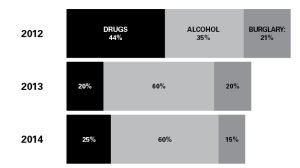Economic development | Enrollment | Budget | Nursing | Housing | International enrollment | Crime | Greek life


When parents imagine their child going off to college, they may have some fears. Aside from alcohol, marijuana is another major substance abused on college campuses. Parents fear that once they kiss their freshmen goodbye, they will be swept off to a party with a funnel of beer shoved down their throat, or a student will shove a bong in their face and hand them a gallon-sized bag of weed.
With the legalization of marijuana happening in nearby states, finding a joint dangling from the lips of a student seems increasingly likely. And the musty-stale smell of marijuana isn’t all that rare.
Compared to neighboring universities, MSU had almost twice as many drug law violation referrals as Tarleton State and 11 times more than Cameron in 2014. However, both Tarleton and Cameron University had more drug law arrests than MSU last year. As of this year there have been 20 cases of marijuana possession to date.
Dail Neely, director of student affairs, said, “It has definitely increased from when I first started here. We had maybe two to three a year. I’ve also been here for 18 years.”
Neely went on to add marijuana is more prevalent, or at least caught more often with the only more prevalent occurrence being alcohol.
In 2014, there were three arrests for alcohol and marijuana. According to the MSU crime log there have only been eight cases in 2015. The nature of these cases includes: public intoxication, consumption by minor, minor in possession and the purchase/furnishing of alcohol to a minor.
Albert Jimenes, campus police sergeant, said, “We receive anywhere from five – 10 cases on average [per year].”
That average has already doubled and the year isn’t over yet.
“It’s always been the paraphernalia,” said Jimenes.
Out of the 20 cases of possession, only three listed that paraphernalia was found with the drug.
Angie Reay, interim director for resident life, said, “We are seeing more these last couple of years. Especially now that they are legalizing it in other states, many are starting
 to see it now as not a big deal.”
to see it now as not a big deal.”
Reay said, “What we see here on campus are mostly after the fact, remains of marijuana.”
Reay thinks this is not a major problem on college campuses.
“It has more impact on the individual person. We find that they are using as a coping skill,” Reay said.
Officials working with residence life said they help students learn from their mistakes, each with a different approach. Rather than simply handing students off to the police, they prefer to handle the cases themselves. Reay said “We use it more as an educational purpose, than a one-strike-you’re-out sort of case.”
For a first offense there is a one-year housing probation and a three-page reflection essay on the incident. On top of that there is an online drug course. That doesn’t mean the police do not get involved. They are notified, but Reay and the Office of Residence Life try to handle the consequences themselves.
Reay said, “Our staff responds and we also call the MSU police. The police take possession of the paraphernalia. If it is a large incident, where it is going to be a criminal case, the police can handle it.”
There are additional sanctions if the case is considered criminal.
“When they get here they have two options: wave their right before the Student Conduct Committee and agree to have a hearing with a judicial officer, or I can send them over to Dail Neely,” Reay said. “If they choose us, they read us the report. After that we talk about it and they determine if they want to take responsibility or not.”
Reay described taking responsibility by saying that in a bust where there are multiple students some may or may not have been involved. When the students come in for their hearing they try to make sure everyone’s stories match so the responsibility can be given to the responsible person.
Once that is established the police handle the case and legalities.
According to Jimenes, “There are two things that can happen: They can be cited a court sanction where they have to see the justice of the peace if found with paraphernalia. They could be referred to the director of conduct. If found in possession they go to the Wichita County jail, where they usually stay overnight and the judge will set bond on them.”
Reay said, “Even though it is legalized in certain states it is still not legalized on campuses. It will be interesting to see how that plays out if it ever gets legalized.”
Students across campus view marijuana as little to no issue at all.
Ashley Robinson, a sophomore in business said, “I don’t see it as a problem but I see a lot people do it [on this campus].”
Taylor Bicknell, a junior business major, said, “Personally I don’t smoke but I don’t think it is a problem. I mean I know it’s illegal, but as long as they’re not driving it’s not bad. I think it should be legalized. If it’s legal for people who are sick, why cant people who aren’t use it.”
Legislature
States have been legalizing the medical use of marijuana and revising laws for minor possession charges. Texas House Bill 2165 was intended for those with first-time convictions, but was not approved. If approved, those with first-time convictions would have their sentence suspended and be placed on community supervision. The consumption of marijuana by minors without parental supervision would remain illegal.
In reality, the legalization of marijuana in Texas remains unlikely.
Robinson said, “No [marijuana will not be legalized in Texas] because it is a conservative state. I think there are a lot of people who are against it.”
Bicknell said, “I feel like Texas is very strict, I’m going to go with no [to it being legalized].”
Neely said, “It depends what Texas chooses to do, either way we will still be dealing with it. Even if it was legalized, if they are underage, it’s still going to be a violation.”
RELATED LINKS
Crime Awareness and Campus Security Act

















